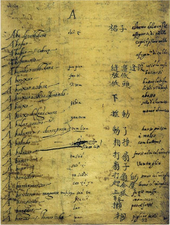- Michele Ruggieri
-
Michele Ruggieri (1543, Spinazzola, Bari, Italy -11 May 1607, Salerno, Italy; Chinese: 羅明堅; pinyin: Luó Míngjiān) was an Italian Jesuit priest. One of the founding fathers of the Jesuit China missions, and a co-author of the first Portuguese-Chinese dictionary, he can be described as the first European sinologist.
Contents
Formation years in Europe
Before entering the Society of Jesus (27 October 1572, in Rome)[1] Ruggieri had obtained, in Naples, a doctorate in utroque iure, that is: in civil and canon law. After completing the Jesuit usual spiritual and intellectual formation Ruggieri left for Lisbon, the gateway of all missionaries to the Far-East. In Lisbon, while waiting for the ship to take him to Goa, he was ordained priest (March 1578).
Missionary in India and China
Soon after ordination (1578) Ruggieri left the shores of Europe with a group of 12 missionaries, among whom Rudolph Acquaviva and Matteo Ricci. Arrived in India (September 1578), he promptly started to study the language used on the Malabar coast and in 6 months reached such proficiency that he could hear confession. It is probably this gift for language that made him an ideal choice for the beginning of the Chinese mission.
With a few companions, Ruggieri sailed to Macau, on the coast of the Celestial Empire. He landed at the Portuguese trade centre on the 20 July 1579 and started at once to learn how to read and write Chinese. In the process, and aware that several will be following him, he set up Shengma'erding Jingyuan (St Martin House'’), the first school for teaching Chinese to foreigners.
Ruggieri's and Ricci's intent all along was to settle somewhere in "real" China - not just Macao, and to that end Ruggieri made a number of trips to Canton (Guangzhou) and Zhaoqing (the residence of the Governor General of Guangdong and Guangxi), making useful contacts with the local authorities. As such he is one of the very first Christian missionaries to have entered the Ming Dynasty Mainland China. After a number of failed attempts to obtain a permission to establish a permanent mission within China, such a permission was finally obtained in 1582, and in 1583 Ricci and Ruggieri finally settled in Zhaoqing, the first stage on the Jesuits' "long ascent" to Peking.[1]
In 1584 Ruggieri published a Chinese catechism, the first book in Chinese written by a European. Visiting villages in the region he baptized several families that formed the nucleus of the first Christian communities in mainland China.
It is thought that during 1583-88 Michele Ruggieri collaborated with Matteo Ricci in creating a Portuguese-Chinese dictionary - the first ever European-Chinese dictionary, for which they developed a consistent system for transcribing Chinese words in Latin alphabet. A Chinese Jesuit Lay Brother Sebastiano Fernandez, who had grown up and been trained in Macau, assisted in this work.[1] Unfortunately, the manuscript was misplaced in the Jesuit Archives in Rome, and re-discovered only in 1934, by Pasquale d'Elia. This dictionary was finally published in 2001.[2][3]
Return to Europe
In November 1588, Ruggieri left China for Rome in order to get the Pope to send an embassy to the Chinese Emperor. This plan had been proposed as a means to allow Jesuits to reach Beijing and to be received by the emperor. But nothing came out of it: the Popes kept dying on him, his own health deteriorated, and eventually the weary Jesuit retired to Salerno, where he died in 1607 without ever going to China again.[1][4]
In Salerno, the retired Jesuit carried on intellectual work that would make China better known in Europe. He completed the Latin translation of the Four Books[citation needed] (the classic Chinese introduction to Confucius’ philosophy), wrote poetry in Chinese, and circulated copies of Chinese maps he had brought along with him from Zhaoqing. Ruggieri was also a much sought after spiritual guide and confessor in the school of Salerno. He died on 11 May 1607.
Bibliography
- DUNNE, G.: Generation of giants, Notre-Dame, 1962.
- GRISONDI, F.A.: M.Ruggieri, Missionario in Cina e primo sinologo europeo, Milano, 1999.
- SHIH, Joseph: Le P.Ruggieri et le problème de l'évangélisation en Chine, Rome, 1964.
References
- (Chinese) Biography at the National Digital Library of China
- (Chinese) About Ruggieri and Ricci at the Vatican Radio
- ^ a b c d (French) Biography at the Ricci 21st Century Roundtable database.
- ^ Yves Camus, "Jesuits’ Journeys in Chinese Studies"
- ^ "Dicionário Português-Chinês : Pu Han ci dian : Portuguese-Chinese dictionary", by Michele Ruggieri, Matteo Ricci; edited by John W. Witek. Published 2001, Biblioteca Nacional. ISBN 9725652983. Partial preview available on Google Books
- ^ Matteo Ricci, Nicolas Trigault. De Christiana expeditione apud Sinas suscepta ab Societate Jesu, Book Two, Chapter 12, "Father Ruggieri goes to Rome to arrange for an embassy from the Pope...". Pages 193-194 in the English translation: Louis J. Gallagher (1953). "China in the Sixteenth Century: The Journals of Matteo Ricci: 1583-1610", Random House, New York, 1953. The original Latin text can be found on Google Books.
External links
Categories:- 1543 births
- 1607 deaths
- Italian Roman Catholic priests
- Italian Jesuits
- Roman Catholic missionaries in China
- Jesuit China missions
- Italian sinologists
Wikimedia Foundation. 2010.

